 Photo from McNeela Instruments
Photo from McNeela Instruments
Originally Posted On: https://blog.mcneelamusic.com/the-irish-trad-session-explained/
Here at McNeela Instruments we love a good trad session. Most of our team are skilled musicians who are active in the Irish music scene and play at all types of sessions.
Those who don’t play themselves still go to as many sessions as they can, as they love nothing more than listening to a few lively tunes. So between us, we’ve definitely learned a thing or two in our time.
The first thing to know about the mighty trad session is that there are a few unwritten rules when it comes to playing or joining in. There’s even etiquette for those who are merely observing, believe it or not.
Don’t let that put you off however. I’m happy to share the ins and outs of Irish session etiquette with you, to help you avoid any embarrassing faux pas.
So if you want to learn how to join in with the next great traditional Irish music session, while causing the least amount of offence, you’ve come to the right place. I’ll teach you everything you need to know to fit in, like a regular stalwart.
First things first…
What is a Trad Session?
A session is a casual and sometimes impromptu gathering of musicians who have come together to play traditional Irish music.
Traditionally Irish music sessions would take place in the kitchen of a local family’s house. House dances were commonplace, with the musicians gathered pumping out tunes for the set dancers.
These homes became known as céilí houses and were typically the homes of large musical families, with other musicians frequently coming and going. Tunes were plentiful and the craic was definitely mighty.
Today, sessions are more commonly found in pubs, and in the many Irish arts and cultural centres throughout Ireland (and indeed the world). That being said, wherever a group of trad musicians is gathered, it’s likely a session will break out.
Whether it’s outdoors, on public transport or even at the departure gate of an airport – it’s almost impossible to stop the tunes from flowing.
Check out this video of an impromptu session with Irish musicians Daoirí Farrell, Robbie Walsh and Geoff Kinsella who chose to lift the spirits of their fellow passengers when their flight was delayed by over two hours:
Then there’s this fine example of the lads from St. Brendan’s College in Killarney, Co. Kerry who decided to share their talents mid-flight. I don’t think I’d object too much to this brilliant in flight entertainment:
Take a look at this street session that took place just outside our pop-up shop at the Willie Clancy Festival.
Note the man on the whistle to the left of the screen, the other on the harmonica to the right, and the woman on the flute who join in later. These casual participants are a regular occurrence at an open session – it’s a perfect example of a session where anyone can join in:
And finally, this pop up shop session that took place at the McNeela Instruments pop-up shop at Fleadh Cheoil na hÉireann in Drogheda. A great Irish trad session can truly pop up anywhere:
How to Find a Trad Session
Geography plays the most significant role in finding an authentic Irish music session to attend.
Obviously it’s an easier task if you’re based in, or visiting, the magical island of Ireland, but Irish music has gained such popularity worldwide that you can now find superb music being played as far afield as China, Japan, Brazil, Australia and of course, the US.
There’s no shortage of sessions to choose from, so how – and more importantly, where – do you find them?
Irish Pubs & Irish Bars
Your local Irish pub or Irish bar (yes there’s a difference) is a good starting point in your search for a session. It’s important to note however that there’s a big difference between Irish pub music and an authentic Irish trad session.
There may well be an Irish bar in every city in the world at this point – we Irish really have travelled far and wide, bringing our culture with us everywhere we go. When abroad (and for the purpose of this discussion ‘abroad’ is considered anywhere other than Ireland), the quality and authenticity of the music found in these “Irish” bars can vary wildly.
The same can be said for Irish pubs here in Ireland however. If you’ve ever set foot in the Temple Bar district of Dublin City, you’ll know exactly what I’m talking about.
Many of these venues are designed as tourist traps, offering “Irish music” with a side of glitz and glam. You’ll find everything from Riverdance-style shows filled with stylised dancing and costumes, to one man and his guitar belting out Ed Sheeran’s Galway Girl. Neither option is ideal for any Irish music enthusiast seeking the real deal.
So how can you spot an authentic session from a novelty act?
A true traditional Irish music session – that’s open for others to join in with – will usually feature a group of musicians huddled in the corner of a pub.
Irish music sessions are usually devoid of what we Irish refer to as ‘notions’. The more casual the better. If you see a stage or microphones, it doesn’t mean the music won’t be enjoyable to listen to, but it’s definitely not an open session for musicians to participate in.
Dublin Trad Sessions
If you ever find yourself in Dublin City seeking out a session, do yourself a favour and avoid Temple Bar. There are two safe havens in the city centre that are guaranteed to provide some true Irish music – The Cobblestone and Piper’s Corner.
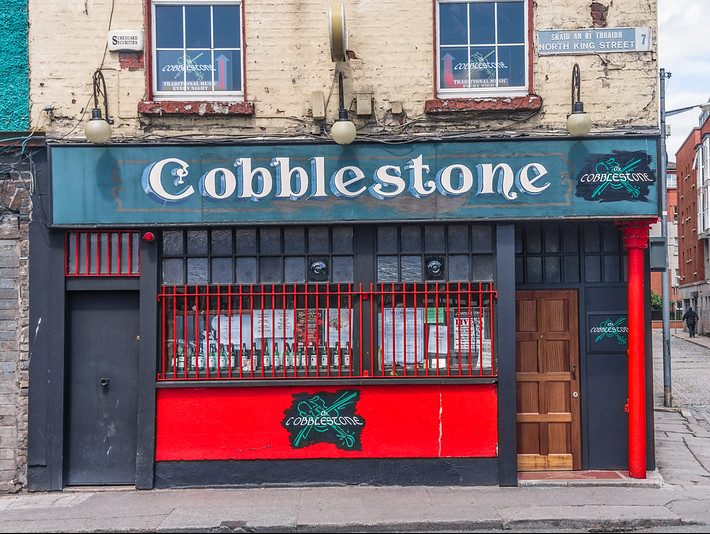 The Cobblestone Pub, Dublin
The Cobblestone Pub, Dublin
The Cobblestone Pub
Run by the Mulligan family, The Cobblestone has become synonymous with the best of traditional Irish music, song and dance. This iconic Dublin pub is most often found bursting at its seams, full to the brim with the best of Ireland’s musicians. I’ve spent many a great night there – pints and tunes flowing.
A word of warning for the uninitiated. The Cobblestone attracts the very best of the Irish trad scene in Dublin. These are experienced musicians who are there to play tunes at an expert level.
Factor in the small size of the pub (it can be tough to find a seat once a session has kicked off) and you have a situation that’s not ideal for beginners. So if you want to join in, make sure you’re up to speed and that you’ve read over my session etiquette rules below.
Don’t be intimidated though. The atmosphere in the pub is friendly and welcoming – The Mulligan family are a lovely bunch. They also host a slow, beginner-friendly session once a week for those whose fingers are not yet up to speed.
So whether you’re a Dublin local or visiting from out of town, The Cobblestone should definitely be on your list of session haunts.
Piper’s Corner
It may come as no surprise to you to learn that Piper’s Corner is co-owned by well known uilleann piper Seán Potts. A relative newcomer to the trad scene in Dublin, this cosy pub hosts nightly sessions featuring some of Ireland’s most talented Irish traditional musicians.
As its name implies, Piper’s Corner is a trad-friendly pub. Not only that, but it’s one of the few venues in Dublin city where Irish is spoken. Many of the staff members are fluent, so if you’d like to practice your cúpla focal, this is the place for you:
Irish Cultural Centres
There are a number of cultural centres throughout Ireland where Irish music sessions can be found on any night of the week.
Comhaltas Ceoltoirí Éireann is Ireland’s national organisation responsible for the promotion and preservation of traditional Irish music, song and dance. It runs a number of regional cultural centres throughout the country where live music is available to musicians of all ages and abilities:
- Áras an Mhuilinn – Mullingar, Co. Westmeath
- Brú Ború – Cashel, Co. Tipperary
- Brú na Sí – Youghal, Co. Cork
- Ceoláras Coleman – Gurteen, Co. Sligo
- Clasac – Clontarf, Co. Dublin
- Cnoc na Gaoithe – Tulla, Co. Clare
- Cois na hAbhna – Ennis, Co. Clare
- Cultúrlann na hÉireann – Monkstown, Co. Dublin
- Dún na Sí – Moate, Co. Westmeath
- Dún Oladh – Omagh, Co. Tyrone
- Kilrush Regional Centre – Kilrush, Co. Clare
- Morrison Teach Cheoil – Riverstown, Co. Sligo
- Oriel Centre – Dundalk, Co. Louth
There are also countless other Irish arts organisations who host Irish music sessions including (but definitely not limited to) Áras Chrónáin, Conradh na Gailge (a mighty spot for tunes in Dublin city centre – be warned, nights can get a little wild), The Séamus Ennis Centre, and many, many more.
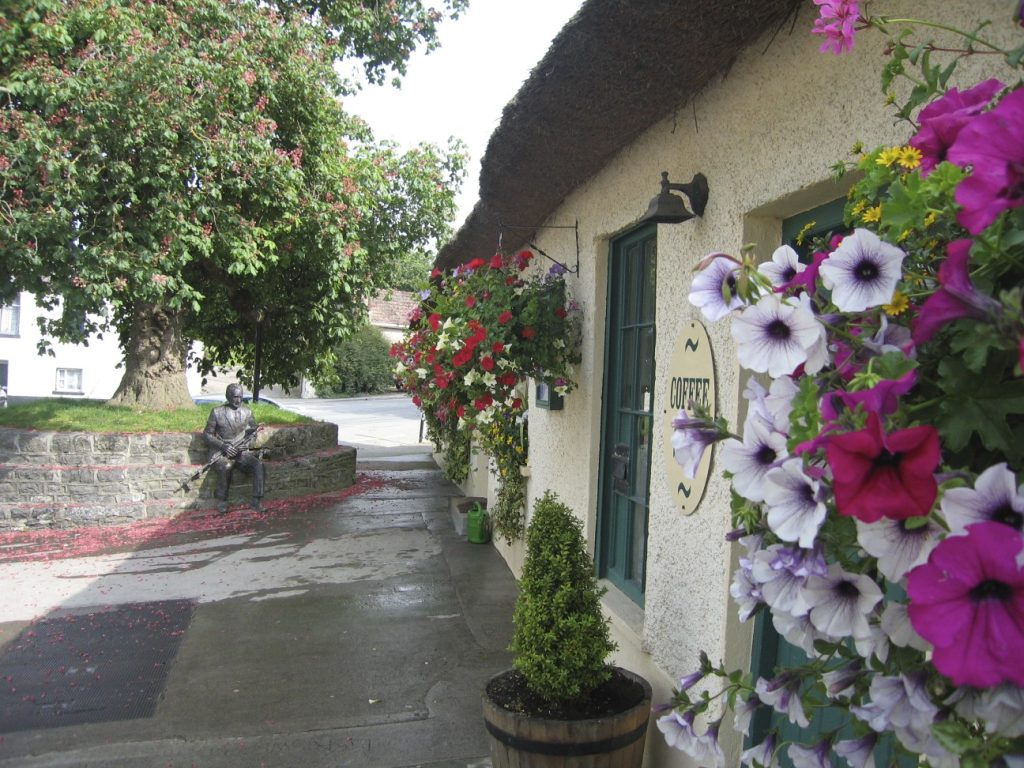 The Séamus Ennis Centre, Naul, North County Dublin
The Séamus Ennis Centre, Naul, North County Dublin
Local Comhaltas Branches
There are hundreds of branches of Comhaltas operating throughout the world in Ireland, Australia, Brazil, the UK, the US and Japan. Most branches run a number of activities including traditional Irish music lessons and Irish trad sessions.
These groups are run on a voluntary basis and are incredibly welcoming to musicians of any experience level. So if you’re looking for a little advice on how to get started, or getting involved with your local Irish music group, I highly recommend contacting your local Comhaltas branch. I promise they will embrace you with open arms.
You can find your local Comhaltas branch via the Comhaltas website.
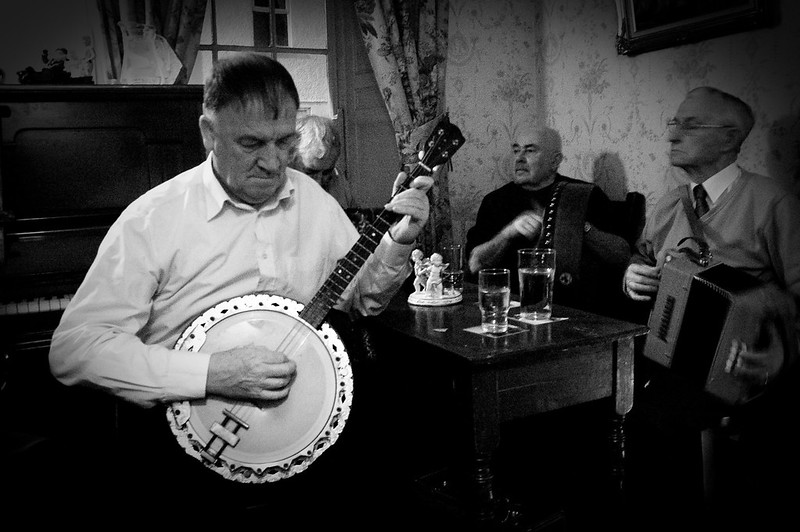 ‘In the parlour at McCollum’s’ – Photo by Gerald Moore
‘In the parlour at McCollum’s’ – Photo by Gerald Moore
Online Research
Finding a new session is a bit easier than it was in my day when you’d have to trek from pub to pub, trying to find the one that was ‘just right’. There are a number of online forums dedicated to the discussion of Irish music that are filled with handy tips and advice on local sessions.
TheSession.org and TradConnect.com are two great points of information with plenty of insider advice on what’s going on where, and even what tunes are popular right now.
Many of the forum members are seasoned musicians themselves who are happy to help and point you in the right direction.
Setting up your own traditional Irish Session
You can of course set up your own session which means you choose the rules, the time and the place. All you need is a venue and a group of likeminded musicians and away you go!
But what are these mysterious rules I keep mentioning? Could there really be that many? Let me explain…
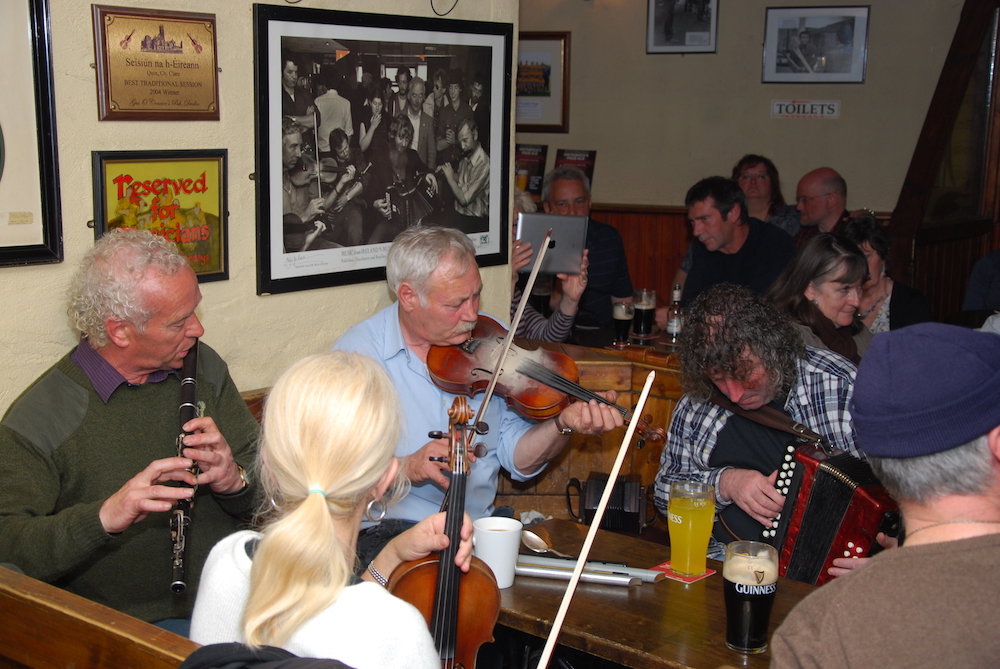
Irish Trad Session Etiquette
For the most part, traditional Irish musicians are a friendly, welcoming bunch but every session is different and has its own personality and participation ideology. So before you try to join in with any music session, here are some things to keep in mind…
Do
- Know your limits. Be honest with yourself about your own ability. Would a group of seasoned musicians welcome you as one of their own, or are you still in the early days of playing? Be considerate of your fellow musicians.
- Know the tunes in advance. If you don’t know the tune (or you’re not an incredibly fast learner), don’t join in. There’s nothing more frustrating than sitting beside someone who is noodling along, only half playing the tune with all the wrong notes. Learn the tunes on your own time. If you hear a new tune that you’d like to be able to play, record it to learn at home later.
- Ask permission to join in. Most groups are welcoming of newcomers, as long as you ask first. I know this can seem intimidating, but the worst that happens is they say no. Then you’ll know it wasn’t the right session for you anyway.
- Tune your instrument. Make sure you’re in tune. Don’t be afraid to ask someone in the group to play a note for you to tune to if needed – they’ll appreciate that far more than you playing sharp or flat.
- Assess the mix of instruments. Are there already two bodhráns playing in the session? Perhaps they don’t need a third joining in. Be patient and wait your turn.
- Learn more than four chords. This one is specially for the accompanists out there who may feel that with four chords and a capo (in the case of guitar players) that they’re ready to take on the world. I admire your confidence, but you’re not yet ready to join in with every set. Try limiting yourself to the tunes that you’re certain those four chords fit with. Otherwise, sit back and listen. To learn more about accompanying traditional Irish music, check out my handy blog post on the same subject: How to Accompany Traditional Irish Music.
Don’t
- Push in. Introduce yourself to the group and ask permission before you join in. Some musicians won’t mind, but most will be irritated by a stranger joining their ranks without so much as a ‘how do you do’.
- Play too loudly. This one is self explanatory really. A good session is all about the group dynamic – you’re not there to be a solo superstar so make sure you’re playing at an appropriate volume that can blend with the other instruments.
- Interrupt the set. Tunes at sessions are typically played in sets of three or four, according to tune type, with each flowing seamlessly into the next. It’s up to the person who started the first tune to choose the next one in the set. Keep an eye and an ear out for their signal that the tune change is coming up, but don’t try to barge in with one of your own.
- Comment on anyone else’s playing or tuning. Compliments are obviously allowed, but I’ve seen a few sessions turn sour when someone has felt the need to tell a fellow musician that their instrument is out of tune.
- Get offended. Irish musicians are the salt of the earth, but there are still a few cantankerous trad purists out there, and you might be unfortunate enough to run into one. These ‘elders’ of the music scene won’t be shy about sharing their opinion on your playing, your tuning, or even your choice of tune. Their bark is usually a lot worse than their bite but they’ve been known to order musicians out of a session if they’re messing up in any way. It’s a true rite of passage to get a dressing down from one of these session grump characters however so try not to take it personally. We’ve all been there and lived to tell the tale. Just laugh it off!
- Take anyone’s seat. Always ask if a seat is free before placing your rear end down.
- Leave your pint on the floor – especially if you’re sitting beside a flute player. Two words: condensation drips.
- Clap along. I’m a patient man who has a lot of time for everyone at a session, but even I would be tempted to ask you to leave if you start to clap along with the music. Leave that to the tourists.
If it’s your first time attending a session it might be a good idea to head along to your chosen session in advance, without the intention of joining in, to observe and listen. It will give you a feel for the atmosphere and the session etiquette in place. You can always join in later when you feel comfortable.
Don’t be discouraged if you find yourself at a session that’s beyond your capabilities. Think of it as the perfect opportunity to learn and see how the pros do it. You may get very lucky and encounter some kindly musician who will invite you to play a tune or two at your own pace, but don’t expect this of them.
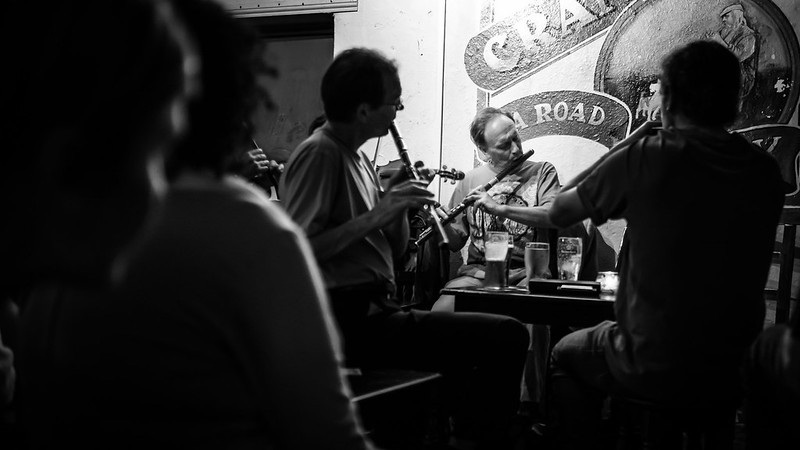 Irish trad session at a pub in Galway by Giuseppe Milo
Irish trad session at a pub in Galway by Giuseppe Milo
Joining a Traditional Irish Music Session
Jumping In
If you’ve found the session of your dreams, have hung around a few times with your instrument under your oxter (elbow), and are on nodding and/or smiling terms with the musicians, it’s time to take the next step and actually play a tune. A polite request to join in on a tune or two is a good start, just make sure that you know it!
Volume Control
Most musicians will have mastered the art of playing ‘under’ the music, ensuring any mistakes are neither audible nor intrusive. So for your first few sessions, let the others propose the set and try to play along without putting anyone off. It’s a good way of building up confidence and showing respect for the other musicians.
Find the Flow
Many musicians have often likened the traditional Irish session to a good conversation, with flow being one of the main desirable attributes. Listen to your fellow musicians, make sure you’re not simply playing in time with them but also matching their playing style, phrasing, ornamentation and swing.
Musical Awareness
It takes a certain sensitivity to partake in a session and luckily most musicians are naturally blessed with it, the ones who aren’t will stick out like a sore thumb.
Don’t be overly shy either about sharing your music however. If you’re confident in your ability, have a fair few tunes under your belt, and play music similar to your session of choice then take it away.
Changing Tune at an Irish Trad Session
You may notice the tune change at 02:03 in the video below but can you work out who proposes it?
The Session Lead
It could be session lead, esteemed fiddler Antóin Mac Gabhann, (middle fiddle player) or legendary Irish accordion player, James Keane, seated facing the five fiddle players. See the subtle eyebrow raise just before the change… Answers in the comment section below please!
Listen and Learn
As the aim of a session is to play together and explore a common repertoire it’s important to choose a session that isn’t too far above your abilities.
If you attend a session where all the players are consistently top-notch, and you’re not yet fully confident in your mastery of your instrument, it might be best to enjoy these sessions as an observer rather than a participant.
Understanding & Respecting the Musical Hierarchy
There’s nearly always an unspoken hierarchy at play at sessions which generally takes the form of beginner or inexperienced musicians giving way to the more seasoned session players or musicians.
The Irish sense of ómós (oh-mose – like the ‘mos’ sound in most) or respect is a very strong element of trad sessions and is the underlying theme of nearly every session worth being at.
You’ll see it very markedly if an older more venerable musician happens to be about. All other players will defer to them, regardless of their own expertise, and they will try to ensure that their playing serves almost as a sort of tribute to that musician. This is why it’s important to brush up up on your Irish folk music and traditional Irish musical knowledge.
The Irish phrase, ‘Ar scáth a chéile a mhairimid‘ is particularly relevant here. It literally means, ‘we live in each others shadow’. It’s an adage that implies reciprocal hospitality and generosity amongst people – it’s particularly relevant when applied to musicians at a session.
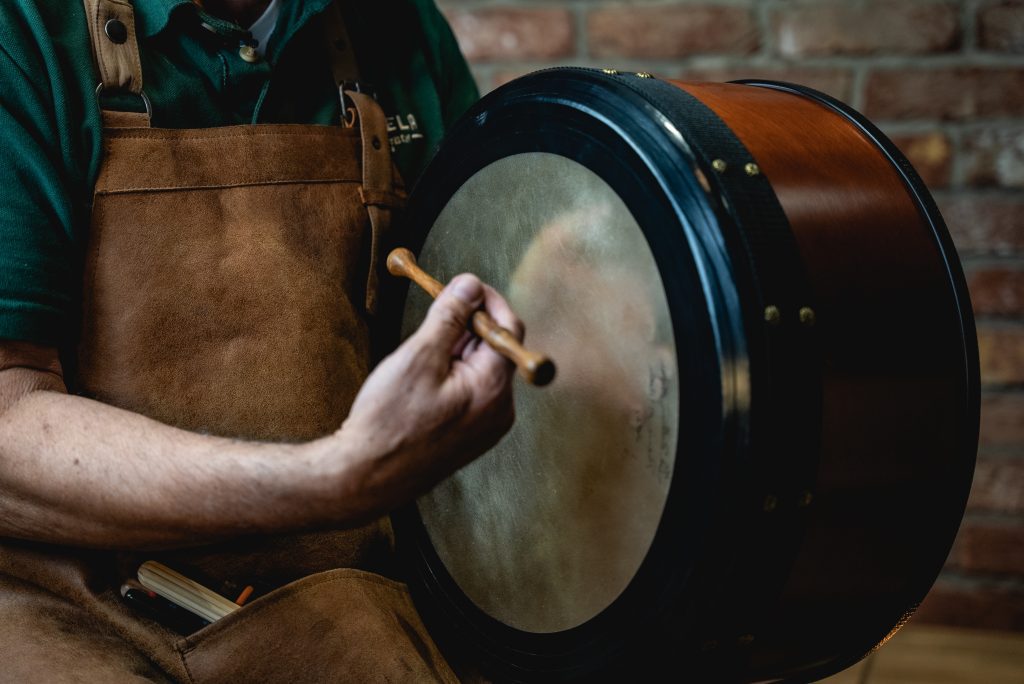
Bodhrán Players at Sessions
Yes bodhrán players, you get your own section. I can’t have you out there giving us all a bad name after I’ve worked so hard all these years…
While the same Irish music session etiquette rules apply to bodhrán players, there are a few more things to keep in mind.
Some musicians will groan inwardly when they see a bodhrán player approach a session – even before the bodhrán player has a chance to show their skills. Fair or not, there still exists within some Irish music circles today a snobbery towards bodhrán players (though some will argue this is borne of bitter experience).
You may feel that this is an unfair slight (though tin whistle players also frequently encounter this same bias) but a bodhrán player needs to display an extra special sensitivity to their fellow musicians. In fairness, we do play a very loud drum that’s capable of dominating a session, and completely ruining the environment for everyone if not wielded carefully.
So please, on behalf of bodhrán players everywhere – and our already dodgy reputation – think before you play.
Listen to the music and make sure you’re in time, and playing at an appropriate volume. If you’re feeling uncertain, play quietly and softly. If you feel you’re out of your depth, resist all temptation to beat that bodhrán.
I promise you this consideration will be much appreciated by the other musicians, and when you do let loose you will find you have a far more receptive audience.
If there happens to be another bodhrán player present and they display better skills than you, pull back a little. Listen and learn.
Try taking a little inspiration from some of the greats: Modern Day Legend of the Irish Bodhrán.

Slow Sessions
While some sessions attract the best of the best – musicians who want to play fast-paced tunes with others of the same level and skillset – there has been a huge increase in recent years of sessions aimed at beginner and intermediate musicians.
These slow sessions take the tunes at a slower, beginner-friendly pace and offer a safe space for those who may not feel ready to join in at full speed. Mistakes are welcome and newbies are encouraged.
The focus is on supporting and encouraging each other and playing for the sheer joy of it, without having to worry about an audience.
These sessions provide the perfect learning environment with a safe and welcoming environment. Usually an experienced musician or two will drop in and lend a hand, to offer advice and help keep the session on track.
There’s no shame at all in starting out with a slow session or beginner session, and working your way up from there. In fact, you may find that your fellow trad musicians progress at the same pace as you and by the time you’re ready to speed things up, they will be too. You’ll have your very own advanced trad session ready to go!
Irish Session Tunes
Some tunes are deemed acceptable session tunes – others are not. Popular session tunes are typically universally playable – in other words, they can be played on any instrument. Certain tunes are better suited to individual instruments are are more suitable for solo performance. It’s important to keep this in mind.
Tunes at sessions are played in sets, not as a standalone tune. A suitable selection of dance tunes will contain three or four tunes of the same tune type – such as jigs, reels or hornpipes – played seamlessly into one another.
If you hear a tune you like at a session don’t be afraid to ask for its name. It’s perfectly acceptable to record it so that you can learn it at home, in your time, at your own pace – but make sure to check with the musicians before you do, just in case. Keep track of the Irish session tunes you like, or hear played most often, and make an effort to learn them. I guarantee it will be time well spent.
Slow airs are not commonly played at sessions, and for good reason. These are not suitable for group performance. Unless you’re a virtuoso soloist, with a deep knowledge and understanding of slow airs, do not attempt to play one at a session.
One more faux pas to avoid: never refer to a tune as a song. Songs have lyrics. Traditional Irish dance tunes do not. Referring to a tune as a song mark you out as a clueless newbie straight away.
If you’re looking for some tips on the best tunes to learn, check out my handy blog section on Irish Session Repertoire. We also offer an exciting range of Irish tune books for players of all ages and abilities. You can browse the full selection in my Irish Music Store.
What does ‘hup’ mean?
One last thing… You may hear this sound a lot or not at all depending on which music sessions you attend, and it might be used for different reasons at different sessions.
The session leader may shout ‘hup’ to indicate that a change of tune is imminent, or to indicate a change of tempo, or even a key change.
You may also hear it said by a member of the audience, or indeed a session player themselves, when the mood strikes, as an expression of enjoyment or general delight.
A versatile little syllable, ‘hup’ can translate to “fair play lads, isn’t the music great? I’m really enjoying it.” – a general nod of encouragement to the musicians.
A word of warning however – try to use it sparingly…
If you want to learn more about the phrase ‘Hup!’, head over to The Session for a comprehensive and rather entertaining discussion of this elusive interjection.
Session Ready
If you’ve made it this far you’re well on your way to being session-ready.
The above is by no means an exhaustive guide to the traditional Irish session. In fact, I’m sure I’ve missed one or two key pieces of advice. There are myriad nuances and insights still to explore, and the best way to do that is to be brave, and get out there. So what are you waiting for?
And as always, McNeela Music is here to help. If you have any questions about tunes, Irish musical instruments, Irish music sessions, learning to play or even finding a teacher, please don’t hesitate to get in touch. We are happy to offer our expert advice and help guide you on your way.
Check out our wide selection of traditional Irish music instruments, and see which one you’d like to carry into your next Irish trad session. We have accordions, banjos, bodhráns, concertinas, fiddles, flutes, whistles and more – plenty to catch your imagination. Hup!

